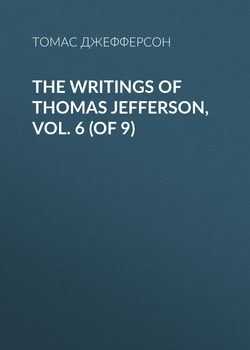Читать книгу The Writings of Thomas Jefferson, Vol. 6 (of 9) - Томас Джефферсон, Thomas Jefferson - Страница 66
PART III.—Continued.
LETTERS WRITTEN AFTER HIS RETURN TO THE U. S. DOWN TO THE TIME OF HIS DEATH.
1790-1826
TO COLONEL MONROE
ОглавлениеMonticello, May 30, 1813.
Dear Sir,—I thank you for the communication of the President's Message, which has not yet reached us through the public papers. It is an interesting document, always looked for with anxiety, and the late one is equally able as interesting. I hope Congress will act in conformity with it, in all its parts. The unwarrantable ideas often expressed in the newspapers, and by persons who ought to know better, that I intermeddle in the Executive councils, and the indecent expressions, sometimes, of a hope that Mr. Madison will pursue the principles of my administration, expressions so disrespectful to his known abilities and dispositions, have rendered it improper in me to hazard suggestions to him, on occasions even where ideas might occur to me, that might accidentally escape him. This reserve has been strengthened, too, by a consciousness that my views must be very imperfect, from the want of a correct knowledge of the whole ground.
I lately, however, hazarded to him a suggestion on the defence of the Chesapeake, because, although decided on provisionally with the Secretaries of War and the Navy formerly, yet as it was proposed only in the case of war, which did not actually arise, and not relating to his department, might not then have been communicated to him. Of this fact my memory did not ascertain me. I will now hazard another suggestion to yourself, which indeed grows out of that one: it is, the policy of keeping our frigates together in a body, in some place where they can be defended against a superior naval force, and from whence, nevertheless, they can easily sally forth on the shortest warning. This would oblige the enemy to take stations, or to cruise only in masses equal at least, each of them, to our whole force; and of course they could be acting only in two or three spots at a time, and the whole of our coast, except the two or three portions where they might be present, would be open to exportation and importation. I think all that part of the United States over which the waters of the Chesapeake spread themselves, was blockaded in the early season by a single ship. This would keep our frigates in entire safety, as they would go out only occasionally to oppress a blockading force known to be weaker than themselves, and thus make them a real protection to our whole commerce. And it seems to me that this would be a more essential service, than that of going out by ones, or twos, in search of adventures, which contribute little to the protection of our commerce, and not at all to the defence of our coast, or the shores of our inland waters. A defence of these by militia is most harassing to them. The applications from Maryland, which I have seen in the papers, and those from Virginia, which I suspect, merely because I see such masses of the militia called off from their farms, must be embarrassing to the Executive, not only from a knowledge of the incompetency of such a mode of defence, but from the exhausture of funds which ought to be husbanded for the effectual operations of a long war. I fear, too, it will render the militia discontented, perhaps clamorous for an end of the war on any terms. I am happy to see that it is entirely popular as yet, and that no symptom of flinching from it appears among the people, as far as I can judge from the public papers, or from my own observation, limited to the few counties adjacent to the two branches of James river. I have such confidence that what I suggest has been already maturely discussed in the Cabinet, and that for wise and sufficient reasons the present mode of employing the frigates is the best, that I hesitate about sending this even after having written. Yet in that case it will only have given you the trouble of reading it. You will bury it in your own breast, as non-avenue, and see in it only an unnecessary zeal on my part, and a proof of the unlimited confidence of yours ever and affectionately.
